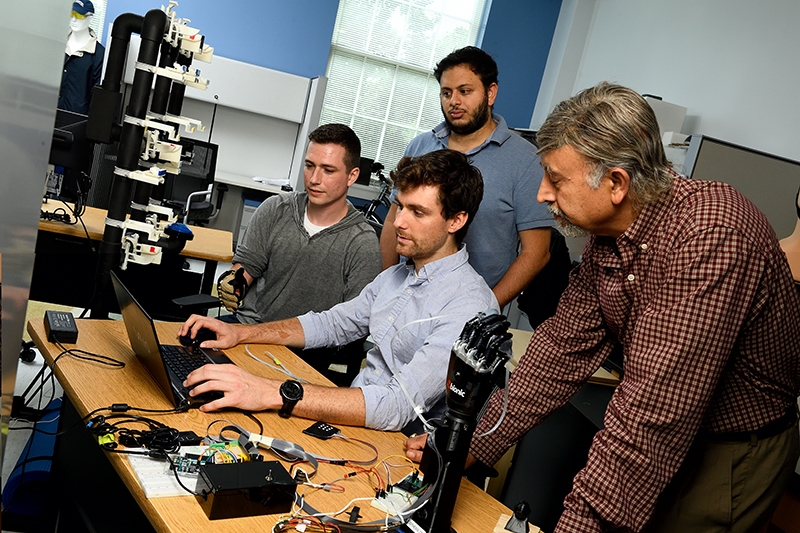Honors Engineering Alumnus Luke Osborn Selected for Forbes '30 Under 30' in Science

Luke Osborn (center) with adviser Nistish Thakor (right) and team members at work in Thakor's biomedical engineering lab at Johns Hopkins University.
In a video produced by University of Arkansas alumnus Luke Osborn (B.S.M.E., summa cum laude, '12), a sleek black prosthetic hand whirs and clicks as the fingers touch a rectangular object, then an egg-shaped one. When a sharply pointed object appears, the bionic hand taps it and recoils, just as a human hand would.
That prosthetic pain reflex is a major victory for Luke Osborn, who was recently selected for the 2019 Forbes "30 Under 30" in science for his pioneering work in producing prosthetics with the ability to feel.
Osborn, the son of Cindy and Steve Osborn of Little Rock, excelled in physics and math classes at Little Rock Central. He began tinkering with robotics as an honors mechanical engineering student at the University of Arkansas and is now wrapping up a doctoral degree in biomedical engineering at Johns Hopkins University, where he has developed an electronic skin that, when applied to prosthetics, allows amputees to feel pressure and pain.
His innovations have been written up in Wired, The Atlantic, and World Economic Forum, among others. He was also named a 2019 Siebel Scholar and received the award for Best Live Demonstration at the Institute of Electrical and Electronics Engineers' 2017 Biomedical Circuits and Systems conference in Turin, Italy.
Linking a Bionic Hand to the Human Brain
Researchers have made great strides in improving control of prosthetics in recent years, but few have tackled touch. Osborn focused on developing an "e-dermis," a rubber covering for prosthetic fingers. The e-dermis is made up of fabric sensors embedded in two layers that mimic human skin — a surface "epidermal" layer that perceives pain, and a deeper "dermal" layer that registers pressure.
The tricky business is connecting the sensory information from the prosthetic fingertips to the human brain. Under the guidance of Nitish Thakor, a biomedical engineering professor at Johns Hopkins who is one of the world's leading innovators in prosthetic design, Osborn has done just that.
"The nerves in the arm still exist, and still go up to the brain," Osborn said. "What we do is send small electrical pulses to find where the nerves are in the amputated limb." Working through four years of trial and error in the lab, Osborn's team has managed to locate those "sweet spots" where residual nerves perceive electrical stimulations from a phantom hand.
"What's interesting is that we do it non-invasively — there's no surgery required," he said. Instead, a metal sensor embedded in a circular patch about the size of a band-aid is placed on residual nerves in the arm. Together with the prosthetic hand, sensory fingertips and a small stimulator that sends out electrical pulses, an amputee can sense a hot burner or pick up and cradle a fragile egg.
Osborn has refined the technology with four volunteers to date.
"It's nice to see their reaction," he said. "A lot of times it's a feeling they haven't felt in a long time. It's not necessarily new but restores sensation they thought was gone forever. It opens up the question, 'what else can I feel? Is there a wider range of sensations I can experience?'"
It's a good bet that Osborn will tackle some of these larger questions. Once his doctoral degree is in hand, he plans to continue research and development work in prosthetics and more generally, in engineering systems that link to the brain and nervous system.
Topics
Contacts
Kendall Curlee, director of communications
Honors College
479-575-2024,
kcurlee@uark.edu
Headlines
PetSmart CEO J.K. Symancyk to Speak at Walton College Commencement
J.K. Symancyk is an alumnus of the Sam M. Walton College of Business and serves on the Dean’s Executive Advisory Board.
Faulkner Center, Arkansas PBS Partner to Screen Documentary 'Gospel'
The Faulkner Performing Arts Center will host a screening of Gospel, a documentary exploring the origin of Black spirituality through sermon and song, in partnership with Arkansas PBS at 7:30 p.m. Thursday, May 2.
UAPD Officers Mills and Edwards Honored With New Roles
Veterans of the U of A Police Department, Matt Mills has been promoted to assistant chief, and Crandall Edwards has been promoted to administrative captain.
Community Design Center's Greenway Urbanism Project Wins LIV Hospitality Design Award
"Greenway Urbanism" is one of six urban strategies proposed under the Framework Plan for Cherokee Village, a project that received funding through an Our Town grant from the National Endowment for the Arts.
Spring Bike Drive Refurbishes Old Bikes for New Students
All donated bikes will be given to Pedal It Forward, a local nonprofit that will refurbish your bike and return it to the U of A campus to be gifted to a student in need. Hundreds of students have already benefited.




